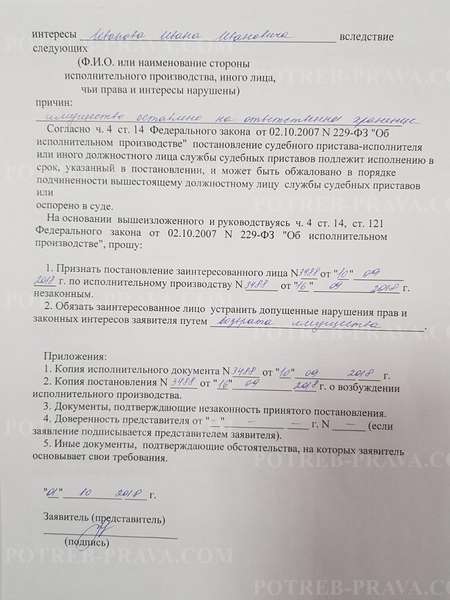⭐ ⭐ ⭐ ⭐ ⭐ Good afternoon, readers of my blog, now we will comprehend the necessary topic for everyone - Do Bailiffs Have the Right to Describe Property If Temporary Registration. Perhaps you may still have questions after you read, so it is best to ask them in the comments below, or even better - get advice from practicing lawyers on all types of law from our partners.
We constantly update information and monitor its updates, so you can be sure that you are reading the latest edition.
- at the address of permanent registration and residence of the obligated person;
- at a temporary residence address (for example, in a rented apartment);
- in non-residential objects owned by the obligated person (for example, a garage);
- in objects owned by other entities, if there is reliable information about the location of the property of the obligated person there (in this case, the procedure for compiling the inventory will differ from the general rules).
Please note that the debtor is obliged to inform the FSSP officer in charge of the case about each change in place of residence and work. Consequently, an attempt to hide from enforcement proceedings may entail additional sanctions.
Time and place of arrest
- call the debtor to the FSSP department;
- request information about the availability of real estate and vehicles;
- travel to the address of permanent or temporary registration of the debtor;
- carry out inspections of residential and non-residential premises where property may be located;
- draw up an act (inventory) including all seized assets;
- independently evaluate the property if its preliminary value does not exceed 30 thousand rubles, or it does not fall under a special list.
According to the law, the Federal Bailiff Service (FSSP) is responsible for the inventory of property. Collection bodies operate in every locality of the country, and their activities are regulated by the Federal Law “On Enforcement Proceedings”.
Seizure of the debtor's property at the place of registration
In everyday life, there are often cases when a person is registered at one address, but lives in a completely different place, maybe even in another city. Sometimes it happens that his relatives - parents, brothers and sisters - do not maintain any contact with him. But if their loved one takes out a loan from a bank and stops paying it off, then, by court decision, FSPP officers will come to exactly the address indicated in the debtor’s passport as the main place of residence. Can bailiffs describe and seize property if the debtor is registered but does not live in this apartment?
This is interesting: Is Money for Health Improvement a Social Payment?
How to prove to the bailiffs that the property does not belong to the debtor?
When bailiffs seized property seized by law from the inventory, their actions are considered invalid. It is impossible to describe the property established in Art. 446 Code of Civil Procedure of the Russian Federation (sole housing, land, personal belongings, food, etc.)
In all other cases, the property is subject to an inventory. But the main factor is the ownership of the property by the debtor. A striking example is the following situation: another owner owns the property, but it is located in the debtor’s apartment. According to the law, bailiffs do not have the right to inventory such property.
But how can one determine whether property belongs to another person? Providing evidence falls on the shoulders of the debtor and the owner of the property. In the absence of evidence that the property does not belong to the debtor, the bailiffs may include it in the inventory.
The evidence is:
- sales receipts, invoices, receipts, warranty cards;
- title documents: copy of deed of gift, purchase and sale agreement, certificate of inheritance, marriage contract.
Important: Witness testimony does not serve as a basis for excluding property from the inventory. The fact of ownership of the property must be documented.
Having demonstrated the title documents for the property, the owner has the right to demand the exclusion of these things from the inventory report. Another important rule follows from this - relatives and third parties are not liable for the debts of the borrower, even if he is registered in their living space.
If you don’t have a residence permit, where will the bailiffs come?
4, paragraph 69 of article 69 of the same legislative act states that in the event that the debtor does not have enough cash and non-cash funds, the remaining amount of the debt can be recovered by seizing property owned by him, regardless of the actual location. Therefore, the first thing a bailiff should check is bank accounts and funds in them. However, paragraph 1 of Article 80 of the same law says a little about the opposite, namely that the bailiff can seize property even while waiting for voluntary execution in order to ensure a guarantee of repayment of the debt while the accounts are being verified.
Who will pay my son's child support debt?
Parents are not required to be responsible for the debts of their adults who are able to independently earn money for their children.
But in the practice of bailiffs there are various cases. If the debtor has not lived with his parents for a long time and is not registered in the apartment, but the bailiffs did not know this for some reason, they still come to describe the property at the place of his possible residence.
In this case, there are no grounds for seizing property in the parents’ apartment. There's no need to get upset. You need to take an extract from the house register, which will indicate that the registration of your son or daughter at this address has been canceled and the exact date.
Also, information about registration is available in the passport of each citizen.
In this case, child support obligations by court decision will most likely be assigned to the parents. If there is a lack of funds, you will have to pay part of the movable property to offset the debt.
#The Bailiff Came #If the Bailiffs Came #Bailiff #Credit Debts #Can They Describe the Property #Will Describe the Property #How Not to Pay the Loan #Nothing to Pay the Credit #Credit #Bailiff #Bank #Arrest of Property #Executive List #Bailiffs Came #Bailiffs #Executive Production #Donation Agreement #Do not open the door to the bailiff #Arrest the property #Can the bailiffs break the door #How to behave with the bailiffs #The bailiffs have come, what to do
Anna’s bailiffs contact the debtor’s place of residence, which is indicated in the registration (“registration”).2 If the debtor’s relatives are registered, it is assumed that he lives there and the bailiffs can seize the property of any of this apartment (note: about the arrest the apartment itself is not in question).3.
Bailiffs operate within the framework of Art. 33 of the Federal Law “On Enforcement Proceedings”, which states that collection is carried out at the place of registration, place of residence or location of the debtor’s property (even if the latter is located with third parties). Thus, it is clear that bailiffs can come to the place of registration and seize the property located in the apartment for debts.
Can a bailiff describe property belonging to relatives?
But even in this case, there are a number of nuances that will help prevent the confiscation process. For example, if bailiffs come with a resolution to make an inventory of an apartment in which a co-borrower is registered but does not live, then citizens living in the living space will be able to leave the property in the house if they provide FSSP employees with supporting documents, for example, a deed of gift or registration of purchase and sale . If the documents confirm that the seized property does not belong to the debtor, but to other persons living at the same address as the co-borrowers, the bailiffs are required by law to lift the seizure.
This is interesting: What Documents Are Needed for Selling a Private House with Land in 2020
How is an inventory of property for debts carried out?
The enforcement procedure begins after 14 days from the date of the court decision. Having visited the debtor’s apartment, the bailiff announces the beginning of an inventory of property for debts:
- Together with the bailiff, the debtor himself and two witnesses must be in the apartment. In some cases, the creditor is also present when property is seized.
- The procedure for conducting an inventory involves drawing up a written protocol of actions - an act of acceptance of property. The responsible bailiff is responsible for drawing up the official paper. The act includes information about those present during the inventory, information about the seized property, the rights of the parties and deadlines for execution.
- The described property is stored in the debtor's apartment or with a third party until it is sold at auction. The period for selling seized property is 5 days from the date of seizure.
- The sale of property at auction takes place at a reduced price, and the proceeds from the sale are contributed to reduce the borrower's debt. The law does not prohibit debtors from selling part of their property, nor does it prohibit them from taking a deferment to repay current debts.
The borrower has the right to appeal the enforcement case.
Appealing the actions of bailiffs
If a citizen believes that in the process of seizing property the bailiffs violated the legal rights and interests of this citizen, he can appeal the actions of the bailiffs.
First of all, within 10 days you will need to file a complaint with the immediate supervisor of the bailiffs who carried out the arrest. Bailiffs are given 10 days to consider the complaint on the merits and provide a response.
applications to appeal the bailiff's decision free of charge in word format
The complaint must contain the following information:
- full name of the body, as well as position, rank, surname, first name and patronymic of the head to whom the complaint is sent,
- surname, name and patronymic of the citizen filing the complaint,
- surname, name and patronymic, position and title of the bailiff, whose illegal actions or inaction the citizen is appealing,
- the reasons that became the basis for appealing against actions or inactions committed by the bailiff,
- the requirements that the citizen seeks to satisfy,
- list of documentation attached to the complaint.
The complaint is sealed with the citizen’s handwritten signature with a transcript and indicating the date of signing.
If the complaint does not lead to the desired results, the citizen will have to go to court. In the statement of claim, in addition to satisfying the requirements previously set out in the complaint, the citizen has the right to demand that those responsible for infringing on the legal rights and interests of this citizen be brought to justice. These claims are exempt from paying state fees.
ATTENTION! Look at the completed sample application to appeal the bailiff's decision:

Ways to Avoid Responsibility
The main way to avoid seizure of accounts and property is timely repayment of debts. If a citizen is unable to repay the debt at once, he can enter into an agreement with the bailiffs and pay the debt in stages, in small payments.
Bailiffs have the right to seize only property owned by the debtor. Property items belonging to the debtor's relatives cannot be seized, but the owners will need to document the fact of ownership of these items.
Watch the video. What property of the debtor do bailiffs have the right to seize?
Is it possible to avoid the arrival of bailiffs at your registration address?
The employment of a bailiff has an advantage for the debtor: you can act proactively, independently come to the bailiff’s department and offer options for repaying the debt. It can be agreed that once a month the debtor himself will bring a specific amount of money, significant relative to the total amount of collection.
In order for the bailiff to quickly execute the court decision, it is in the interests of the claimant to inform the bailiff where the debtor actually lives, where he and his property can be found.
What will be done with the property in the future?
Despite the fact that, in accordance with the norms enshrined in Article 84 of the Federal Law of October 2, 2007 No. 229-FZ “On Enforcement Proceedings,” after seizing property, bailiffs have the right to seize this property, this measure is used quite rarely.
This situation is explained by the fact that bailiffs do not have premises for storing seized property. However, if a seizure is imposed on products made of precious stones and metals, as well as cash, then such property is almost always confiscated.
If during the process of seizure it is not possible to determine the approximate value of the property, then the bailiffs appoint a procedure for assessing this property. The corresponding entry is made in the act.
Objects of property that have been seized can be left for safekeeping with a citizen or transferred for safekeeping to other persons.
Can bailiffs deprive a driver’s license for debt?
A citizen who has received property for safekeeping is responsible for the integrity and safety of all items of property received for safekeeping. A citizen has the right to use these objects, but this property cannot be sold or transferred to other persons without the consent of the bailiffs.
A citizen who has received seized property for safekeeping and has violated the terms of safekeeping may be held accountable in accordance with Article 312 of the Criminal Code of the Russian Federation.
Do bailiffs have the right to independently determine the value of property subject to seizure? Yes, and this is not just a right, but a direct responsibility. The act drawn up during the seizure process indicates the estimated value of the property.
The approximate price is not the market value of the property and not the price at which this object was purchased, but this is the price for which this object can be sold in the shortest possible time.
Attention! It is beneficial for a citizen whose property is being seized if the undervalued value of the property is indicated. If the estimated value of the seized property does not exceed 30,000 rubles, the citizen has the right to file a petition for the independent sale of this property.
For example, if the estimated value of the seized property is 8,000 rubles, a citizen can find and transfer this amount to the bailiffs without actually selling the property. And the bailiffs will indicate that the seized property has been sold, the funds from the sale have been received, and the citizen has no other property that can be seized.
A citizen who has filed a petition for the independent sale of seized property is given 10 days to complete this procedure. During this time, bailiffs issue a decision to suspend enforcement measures.
If, after 10 days, the funds received by the citizen from the sale of property are not transferred to the bailiffs, the forced collection procedure is resumed, and the property is sold in other ways.
Thus, if the value of the seized property does not exceed 30,000 rubles, this property is transferred for sale to third parties. If the value of the seized property exceeds the above amount, then the bailiffs organize an auction at which this property is sold.
Exception from the inventory
There is another option to avoid the seizure of a particular property. Based on the norms enshrined in Part 1 of Article 119 of the Federal Law of October 2, 2007 No. 229-FZ “On Enforcement Proceedings,” a citizen who owns a specific piece of property has the right to challenge the seizure.
To do this, he will need to file a claim in court. Based on the norms enshrined in Article 56 of the Civil Procedure Code of the Russian Federation, the responsibility to prove the legality of the demands put forward is assigned to the plaintiff. Based on this, the citizen who submitted the application will need to attach to this application documentation confirming the right of ownership of this citizen to a specific property.
We emphasize that based on the provisions enshrined in paragraph 51 of the resolution of the plenum of the Supreme Court of the Russian Federation and the plenum of the Supreme Arbitration Court of the Russian Federation dated April 29, 2010 No. 10/20 “On some issues arising in judicial practice when resolving disputes related to the protection of property rights and other real rights”, the defendants in this claim are the debtor and the claimant.
The Federal Bailiff Service is involved in this process as a third party in the case. An analysis of practice shows that situations in which a seizure is imposed not on the property of the debtor, but on the joint property of the spouses, occur quite often. This is explained by the difficulty of allocating the share owned by the debtor in joint property.
Remember! Based on the norms enshrined in Article 256 of the Civil Code of the Russian Federation and Article 45 of the Family Code of the Russian Federation, arrest can be imposed exclusively on that part of the joint property that belongs to the debtor.
In such a situation, the bailiffs need to apply to the court with a petition to allocate the share owned by the debtor in the joint property. And only the share allocated by the court and belonging to the debtor can be seized.
Law Club Conference
I don’t understand what else is explanatory! Does such a practice exist? Does this mean that the order was not issued in accordance with the law? This means that a representative of the government - a bailiff - does not have the right to record the debtor’s certificate and draw up THIS IS THIS? — “In the course of fulfilling the requirements of the enforcement authority (number), the reason for giving the order to another bailiff was established: the debtor actually lives (address).”
During the first visit, when there was no one in the apartment, the neighbor said that he did not remember anything like the debtor. I believe that this does not matter, since the debtor HIMSELF gave this residential address to the bailiff who issued the order. That is, to describe is EQUIVALID to the inventory at the place of registration, right?







